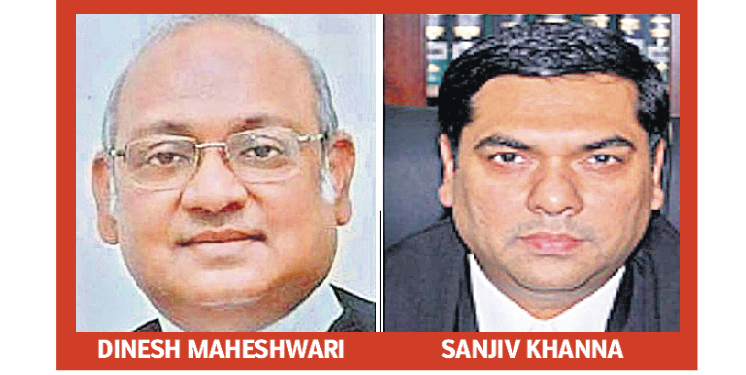New Delhi: Ignoring the row over his elevation that has led to supersession of several judges, the Government Wednesday appointed Delhi High Court judge Sanjiv Khanna to the Supreme Court as recommended by the apex court’s Collegium.
A government notification also said President Ram Nath Kovind appointed Karnataka High Court Chief Justice Dinesh Maheshwari as a judge of the apex court. With the two appointments, the strength of the top court will rise to 28 with three vacancies.
The five-member SC Collegium headed by Chief Justice of India Ranjan Gogoi January 11 recommended to the government the elevation of Justices Maheshwari and Khanna to the top court.
The appointment of Justice Khanna was announced on a day when the chorus of protests against the collegium’s recommendation to elevate him grew louder with Bar Council of India (BCI) saying it is “whimsical and arbitrary” and will lead to “humiliation and demoralisation” of the superseded judges.
Sitting Supreme Court judge Sanjay Kishan Kaul has already written a note to Justice Gogoi and fellow judges in the collegium – Justices A K Sikri, S A Bobde, N V Ramana and Arun Mishra — for ignoring the seniority of Chief Justices of the High Courts of Rajasthan and Delhi, Pradeep Nandrajog and Rajendra Menon, respectively. Sources said Justice Kaul was of the view that a wrong signal would go out if the two chief justices, who are up in the seniority list than Justice Khanna, would be left out for elevation as apex court judges.
Justice Khanna stands at Sl. No. 33 in the combined seniority of high court judges on all-India basis.
Former CJI RM Lodha said the unprecedented January 12, 2018 press conference by four senior judges including Gogoi before he became the CJI has not served the purpose for which it was held and instead the concerns raised including the functioning of Collegium for appointment of judges for higher judiciary have aggravated. “Looking at the overall reaction and perception, it would be better if the matter (of Khanna) is recalled and considered threadbare but this seems unlikely to me,” he said. “The concerns remain the same. Rather, they seem to have aggravated by this exercise (recent recommendations). I don’t think there is any change. At least it is not visible to the public at large. It has not served its purpose because we don’t find the changes which the press conference wanted to have really taken place,” Justice Lodha told reporters.
Justice Kailash Gambhir, a former Delhi High Court judge, also wrote to President Kovind January 14 expressing concern over the collegium bypassing the seniority of judges.
The BCI, which is an apex body of lawyers, said the decision of the collegium was viewed by the Bar and the common man as “unjust and improper”.
In a statement, BCI chairman Manan Kumar Mishra said the supersession of several senior Judges and chief justices of the country cannot be tolerated by the people and the revocation of the earlier decision recommending the names of Justices Nandrajog and Menon is viewed as ‘‘whimsical and arbitrary’’.
“They are men of integrity and judicial competence; nobody can raise a finger against these judges on any ground. The decision will certainly lead to humiliation and demoralisation of such judges and also of several other deserving senior judges and chief justices of high courts,” Mishra said.
The bar body said it was watching the “strong resentment and reaction of the Indian Bar” as well as keeping a tab on the comments of intellectuals, social activists and general public “which shows that the faith of the people has abruptly eroded from our collegium system in recent past”.
While maintaining that the BCI was hard-pressed to raise these issues, it said even the Bar Council of Delhi also adopted a resolution against the decision of the collegium.
Further, the statement said several state Bar Councils, high courts, Bar Associations and other Bar Associations of the country have written to the BCI, pressing it to raise this issue and agitate the matter before the government and the Collegium judges.
China’s Ascent
China’s crime is that in the next few years, perhaps as soon as 2035, it will be the world’s largest...
Read more





































